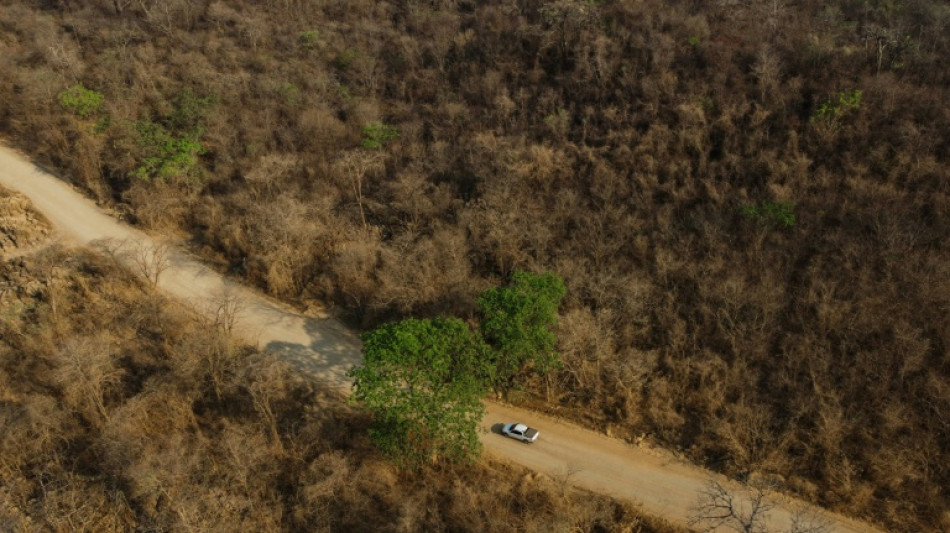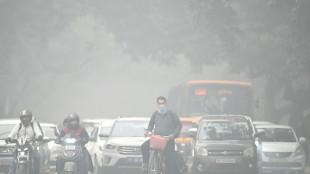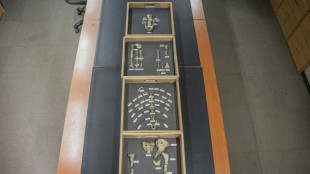
-
 Davis Cup organisers hit back at critics of Nadal retirement ceremony
Davis Cup organisers hit back at critics of Nadal retirement ceremony
-
Noel in a 'league of his own' as he wins Gurgl slalom

-
 A dip or deeper decline? Guardiola seeks response to Man City slump
A dip or deeper decline? Guardiola seeks response to Man City slump
-
Germany goes nuts for viral pistachio chocolate

-
 EU urges immediate halt to Israel-Hezbollah war
EU urges immediate halt to Israel-Hezbollah war
-
Basel votes to stump up bucks to host Eurovision

-
 Ukraine shows fragments of new Russian missile after 'Oreshnik' strike
Ukraine shows fragments of new Russian missile after 'Oreshnik' strike
-
Six face trial in Paris for blackmailing Paul Pogba

-
 Olympic champion An wins China crown in style
Olympic champion An wins China crown in style
-
It's party time for Las Vegas victor Russell on 'dream weekend'

-
 Norris applauds 'deserved' champion Verstappen
Norris applauds 'deserved' champion Verstappen
-
Kohli blasts century as India declare against Australia

-
 Verstappen 'never thought' he'd win four world titles
Verstappen 'never thought' he'd win four world titles
-
Former Masters champion Reed wins Hong Kong Open

-
 Awesome foursomes: Formula One's exclusive club of four-time world champions
Awesome foursomes: Formula One's exclusive club of four-time world champions
-
Smylie beats 'idol' Cameron Smith to win Australian PGA Championship

-
 Five key races in Max Verstappen's 2024 title season
Five key races in Max Verstappen's 2024 title season
-
Max Verstappen: Young, gifted and single-minded four-time F1 champion

-
 'Star is born': From homeless to Test hero for India's Jaiswal
'Star is born': From homeless to Test hero for India's Jaiswal
-
Verstappen wins fourth consecutive Formula One world title

-
 Survivors, sniffing dogs join anti-mine march at Cambodia's Angkor Wat
Survivors, sniffing dogs join anti-mine march at Cambodia's Angkor Wat
-
Far right eye breakthrough in Romania presidential vote

-
 Jaiswal slams majestic 161 but Australia fight back in Perth
Jaiswal slams majestic 161 but Australia fight back in Perth
-
Edinburgh's alternative tour guides show 'more real' side of city

-
 IPL teams set to splash the cash at 'mega-auction' in Saudi Arabia
IPL teams set to splash the cash at 'mega-auction' in Saudi Arabia
-
Olympics in India a 'dream' facing many hurdles

-
 Wounded Bangladesh protesters receive robotic helping hand
Wounded Bangladesh protesters receive robotic helping hand
-
Majestic Jaiswal 141 not out as India pile pain on Australia

-
 Giannis, Lillard lead Bucks over Hornets as Spurs beat Warriors
Giannis, Lillard lead Bucks over Hornets as Spurs beat Warriors
-
Juan Mata agent slammed as 'cowardly' by angry A-League coach

-
 Marta inspires Orlando Pride to NWSL title
Marta inspires Orlando Pride to NWSL title
-
Palestinian pottery sees revival in war-ravaged Gaza

-
 Main points of the $300 billion climate deal
Main points of the $300 billion climate deal
-
Robertson wants policy change for overseas-based All Blacks

-
 Israel retreat helps rescuers heal from October 7 attack
Israel retreat helps rescuers heal from October 7 attack
-
Afghan women turn to entrepreneurship under Taliban

-
 Mounting economic costs of India's killer smog
Mounting economic costs of India's killer smog
-
At climate talks, painstaking diplomacy and then anger

-
 Uruguayans head to polls with left hoping for comeback
Uruguayans head to polls with left hoping for comeback
-
Trump's mass deportation plan could end up hurting economic growth

-
 Iran director in exile says 'bittersweet' to rep Germany at Oscars
Iran director in exile says 'bittersweet' to rep Germany at Oscars
-
US consumers to bargain hunt in annual 'Black Friday' spree

-
 Cheers, angst as US nuclear plant Three Mile Island to reopen
Cheers, angst as US nuclear plant Three Mile Island to reopen
-
Scientists seek miracle pill to stop methane cow burps

-
 Australia ditches plans to fine tech giants for misinformation
Australia ditches plans to fine tech giants for misinformation
-
Developing nations slam 'paltry' $300 bn climate deal

-
 Red Bulls win 'Hudson River derby' to reach conference final
Red Bulls win 'Hudson River derby' to reach conference final
-
Neuville wins world rally title after Tanak crashes in Japan

-
 Colapinto cleared for Las Vegas GP despite heavy crash
Colapinto cleared for Las Vegas GP despite heavy crash
-
'Smiling One' Amorim vows he has ruthless streak Man Utd need


Green shoots spring from ashes in Brazil's fire-resistant savanna
The huge wildfires that ripped through Brazil recently did not spare its vast tropical savanna, but green shoots are already emerging from the ashes there, proof of the vast grasslands' rare gift for fire resistance.
The Cerrado, the most species-rich savanna in the world, covers some two million square kilometers of land (770,000 square miles) in central Brazil -- nearly one-fifth of the country's entire surface area.
In Brasilia National Park, on the outskirts of the nation's capital, blackened soil and charred tree trunks stand testimony to the ferocity of a fire that ripped through 1,470 hectares (3,600 acres) of land in September.
Brazil was then in the throes of a record drought -- the city of Brasilia had gone 169 days without a drop of rain -- which lit the torch under the worst wildfire season in over a decade, blamed by experts at least partly on climate change.
But the Cerrado, which is less well-known than the neighboring Amazon and Pantanal wetlands, has a superpower: over millions of years, it has developed some resistance to flames and high temperatures.
- Upside-down forest -
"The Cerrado is an inverted forest. We see only a fraction of it because the forest is all under our feet," said Keiko Pellizzaro, an environmental analyst at the Chico Mendes Institute for Biodiversity Conservation, a government agency.
The Cerrado's deep root system acts like a "pump," sucking up groundwater "even during extreme drought," she said.
Meanwhile, above ground the trees' thick bark and the shells of the fruit act as "thermal insulators," said Isabel Schmidt, professor of ecology at the University of Brasilia.
Even if temperatures reach up to 800 centigrade (1,470 Fahrenheit), the vegetation can survive "as if it were just another hot day," she said.
A month after the recent fires, the first rains saw grass and small plants quickly beginning to grow, and new leaves sprouted on charred trees in Brasilia National Park.
"Even if it hadn't rained, we would have seen some resilience," Pellizzaro said.
"I'm amazed by its capacity for regeneration," said Priscila Erthal Risi, a 48-year-old volunteer who took part in an operation by the Chico Mendes Institute to replant the reserve with native species such as donkey's tail and Magonia pubescens trees.
- Tested to the limit -
Brazilian police are still investigating the cause of the fire in Brasilia National Park.
Most wildfires in Brazil are started by farmers or agribusiness workers to clear land for cattle grazing or crops.
Schmidt said the Cerrado's vegetation had always survived sporadic fires caused by lightning strikes during the rainy season.
But she warned that if extreme droughts become more frequent the biome's resilience could be tested.
"The resistance that plants and animals have to any type of fire was developed over millions of years, but climate change has taken place in a matter of decades. No organism can adapt that quickly," she said.
- 'Cradle of waters' at risk -
The Cerrado is crucial not only for the survival of the thousands of species that call it home but for the water supply of a large part of South America.
The so-called "cradle of waters" is home to the sources of some of the continent's biggest rivers and aquifers.
But its role as a continental spring is endangered.
With the rainy season starting later and later each year and the amount of rain declining by eight percent on average over the past three decades, the flow of the Cerrado's rivers has fallen by 15 percent.
If wildfires become more frequent, Schmidt warned, "many ecosystems that are more vulnerable to fire," including in the Cerrado, "will simply not survive."
P.Mira--PC



